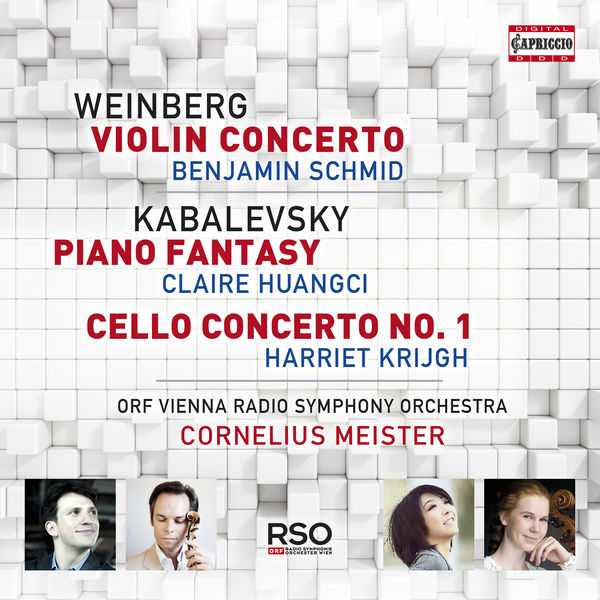
Composer: Dmitry Kabalevsky, Mieczyslaw Weinberg
Performer: Benjamin Schmid, Claire Huangci, Harriet Krijgh
Orchestra: Radio-Symphonieorchester Wien
Conductor: Cornelius Meister
Format: FLAC (tracks)
Label: Capriccio
Catalogue: C5310
Release: 2018
Size: 255 MB
Recovery: +3%
Scan: cover
Weinberg: Violin Concerto in G minor, Op. 67
01. I. Allegro molto
02. II. Allegretto
03. III. Adagio
04. IV. Allegro risoluto
Kabalevsky: Fantasy in F Minor (After Schubert’s Fantasy, D. 940)
05. I. Allegro molto moderato – Più mosso – Tempo I
06. II. Largo
07. III. Vivace – Cadenza – Largamente – Allegro marcato
Kabalevsky: Cello Concerto No. 1 in G minor, Op. 49
08. I. Allegro
09. II. Largo – Molto espressivo
10. III. Allegro – Allegro molto
Here is proof that the concertos from the Russian and Soviet spheres do go beyond Tchaikovsky, Shostakovich and Prokofiev after all! The Concerto by Mieczysław Weinberg, written in 1959 and dedicated to Leonid Kogan, is one of those impressive masterpieces that far too few great soloists have overlooked. This music is powerful, its immediacy somewhat redolent of Khatchaturian, but without the slightly “everyman” quality of the Armenian composer; and the richness of the writing is much more evocative than ShostaProko without ever copying them or even resembling them: it is 100% Weinberg. The work is played by Viennese violinist Benjamin Schmid, who may not have the slick marketing operation of many modern soloists, but is very much a match for any of them.
On the second part of the album, Kabalewski’s Fantasia for Piano turns out to be nothing other than an orchestration (albeit “augmented” with some counter-thematic ornaments which are not Schubert’s) with a lead piano of Schubert’s Fantastia for Four Hands! Claire Huangci is behind the piano, well-known to the orchestras of Philadelphia, Stuttgart, Berlin, the Mozarteum, Vancouver, Munich and others of the same calibre. The album closes with Kabalewski’s First Cello Concerto, written in 1949. Between Weinberg and Kabalewski, naturally, there is a chasm: for while Weinberg was persecuted by the Soviet dictatorship throughout his life, Kabalewski knew how to go with the flow (admittedly a necessity if he didn’t want to end up in Siberia or in the ground), and wrote music which was clearly more consensual and straightforward to the listener. This doesn’t in any sense mean that he was writing “easy” music, or that it is short on moments of great inspiration. The Concerto is performed by the Dutch cellist Harriet Krijgh, who has pursued a sparkling international career since taking first prize at the Dutch Prinses Christina Concours, as well as first prize at the Amsterdam Cello Biennale.
Dmitry Kabalevsky – despite the vague name recognition a widely unknown composer of socialist-realist music – has rightly been forgotten, if only because of his actively unsavory, toadying, opportunist politics that netted him three Stalin Prizes and four Orders of Lenin. He was chummy with the Russian Association of Proletarian Musicians when that seemed expedient and later a very active member of the Union of Soviet Composers. Weinberg is the exact opposite of Kabalevsky, politically and musically. He was a life-long victim of the Soviet Union and his music is – some genuine incidences of humor apart – a dense shot of genius that makes breathing difficult, not easy. With this Album Capriccio presents with a famous cast the music of two nearly forgotten Russian Masters their music and biography could not be more different.